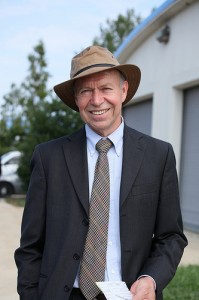We have much more to do and your continued support is needed now more than ever.
Courage, Credibility and Conviction: James Hansen’s Remarkable Career at NASA
This piece originally appeared on Climate Access.

Some of the first scientific papers I read in graduate school were those describing the climate models that James Hansen and colleagues developed during the early 1980s. I can recall going to the university library to find the bound volumes of the journals, and then photocopying the articles page by page. At upwards of 40 pages each and 5 cents a page, it would add up for a poor student budget! But, they were worth every penny. These papers were rich in technical details. As someone new to climate science, I was in awe of what Hansen and colleagues had accomplished; fascinated by how much they had learned by developing these remarkable computational tools.
By the time I finished graduate school and packed up my dog-eared copies of these papers, I realized just how much we still didn’t know about climate change. I knew much more about the inner workings of climate models – where they had good observational data to support the calculations and where they had to rely on theory or assumptions in the absence of observations. These uncertainties led many scientists to provide multiple caveats about the model projections when they spoke publicly about their research results.
But, not James Hansen. He had been speaking out about the risks of climate change since the 1980s. Whereas many scientists emphasized all the things we still didn’t know about climate change, Hansen was telling people what we did know, often at significant professional peril. He was speaking to Congress, presidential administrations, and the media about the real and present danger posed by our addiction to fossil fuels. He was approaching his research in such a way to provide cutting-edge scientific results with high relevancy to policy. He was making sure people knew about those results and the implications for our energy and pollution choices.
And, so out of everything I have learned from his impressive body of work, the most important lesson I have taken from Hansen’s career is this: We know quite a lot about climate change and have a crucial responsibility to help people understand the risks we face. Climate models are imperfect, but they still are incredibly important tools that provide essential information to guide societal decisions. We’ll never be able to observe the earth system in its entirety or perfectly predict the future, but we have ample knowledge of climate change to inform action.
Hansen has combined impeccable scientific credibility with a strong voice advocating for climate action in a way that few other scientists have managed. In recent years, he has increasingly taken a more personal approach to science communication, often mentioning his grandchildren as a strong motivation. It is this combination of science, advocacy, and humanity that makes Hansen’s climate communication efforts so compelling. I look forward to seeing how he continues to advance climate science communication—and what further lessons he has for all of us!—in this next stage of his career.




















